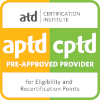Product Details
Topics Covered
- Design Applications
- The Role of a Designer
- Elements of Design
- Communication and Messaging
- Basic Web Design Principles
- UX Principles for Designers
- Prototyping
- The Importance of Research
- Data Analytics for Designers
- Communicating Findings
- Design Trends
- Creativity and Innovation
- Design Thinking
- Tools and Technology for Designers
- Leading a Design Team
Key Features
- Mobile-friendly
- Audio-enabled
- Badge and credit-awarding
- Real-world case studies
- Fully accessible
- Games & Flashcards
- Expert-supported
- Video content
Course Preview
Course Description
Learning Outcomes
- Define key concepts relevant to effective design practices
- Name areas of specialization and potential career paths for designers
- Describe the application of design in different contexts
- Describe basic UX principles and how to apply them
- Define prototyping and recognize prototyping strategies
- Differentiate between qualitative and quantitative research methods
- Explain the role of data in design and define key terms related to data analytics
- Examine methods for promoting creativity and innovation in teams and organizations
- List and describe the stages of design thinking
- Recognize key project management principles and how to apply them to design projects
Notes
This course has an "Ask the Expert" feature, which submits your questions directly to an expert in the field you are studying. Questions are answered as quickly as possible and usually within 24 hours.
As an Accredited Provider, MindEdge offers for its learning events that comply with the Continuing Education and Training Standard.
Learners must achieve an average test score of at least 70% to meet the minimum successful completion requirement and qualify to receive credit. Learners will have three attempts at all graded assessments.

